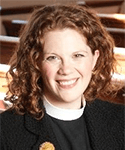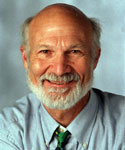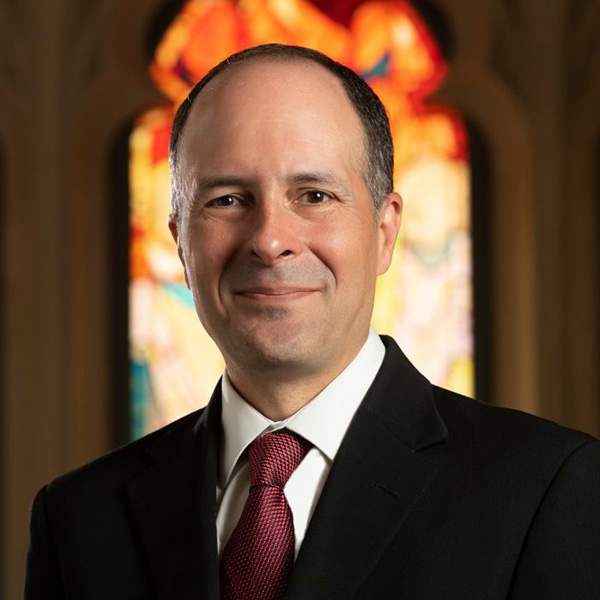Editor’s note: Faith & Leadership offers sermons that shed light on issues of Christian leadership. This sermon was preached in Duke University's Baldwin Auditorium on May 24, 2015.
After hearing the sound of a rushing, violent wind, and seeing the divided tongues like fire resting on each of them, and hearing those filled with the Spirit speak in other languages, it is no surprise that those present ask each other the question, “What does this mean?” (Acts 2:12).
Of course, some think they are drunk from wine from a college frat party.
Peter assures them later that they are not drunk at all with spirits but filled with another Spirit.
“What does this mean?”
It’s a great question. People have been interpreting this passage for centuries, trying to figure out what it means.
This Acts passage has a special place in my historical memory, since I spent my childhood and adolescent years in a classical Pentecostal church. (I’m ordained a Baptist, so I guess that makes me a Bapticostal.)
In classical Pentecostal doctrine, Acts chapter 2 is used as a proof text to teach that the initial physical evidence of a person having received the baptism of the Holy Spirit is speaking in tongues. This experience is subsequent to conversion. I heard this doctrine my entire life.
I heard and saw many things in that Miami, Florida, congregation. I heard people speaking in tongues. I saw people get slain in the Spirit. I heard ecstatic music with drums, organs, guitars and brass instruments. I saw people clapping, dancing and shouting. I can confirm writer James Baldwin’s description of the Pentecostal experience in his father’s church, when he says, “I have never seen anything to equal the fire and excitement that sometimes, without warning, fill a church, causing the church … to ‘rock.’” There weren’t necessarily Holy Rollers, but we definitely had some holy rockers.
Pentecostalism, in all its forms, has exploded all over the world and is a major force in global Christianity, such that we have charismatic Catholics and charismatic Anglicans, perhaps even charismatic Duke Chapelians. The world’s Christian population has shifted from the “north” to the “global south,” and this shift has been due to the tremendous growth of Pentecostal communities worldwide -- in sub-Saharan Africa, Latin America and numerous parts of Asia.
The largest Christian congregation in the world, the Yoido Full Gospel Church, is in Seoul, South Korea, which claims 800,000 members (this makes Joel Osteen’s church look like a mini-church).
As a PK -- a preacher’s kid -- I’ve seen and experienced all kinds of things in church in general, and in the church of my youth in particular. The rhythmic clapping and dancing were captivating at times, but they weren’t the only things that captivated me at a young age in that congregation, because I also met a little 7-year-old girl who is now my wife.
Pentecost has its benefits! But what does it really mean? Or more accurately, what are its meanings?
Liturgically, Christians celebrate Pentecost as an end of the Easter season at 50 days, linking the resurrection and ascension of Christ with the sending of the Holy Spirit.
Historically, Pentecost was related to the Jewish harvest festival of Shavuot, or Feast of Weeks. It commemorated the giving of the Law at Sinai but also celebrated the harvesting of wheat. During this festival, people could bring their first fruits to the temple as an offering.
Using this historical lens, one might then say that Pentecost is the human experience of the first fruits of the Spirit. The liturgical or historical significance of Pentecost is not unimportant, because it is part of its meanings. As Christians, it is vital to attempt to answer the question, “What does this mean?” because Pentecost -- and Pentecostalism -- is not going away; it is on the rise, if not in actual experience, in the collective consciousness of the global church.
In the third wave of the National Congregations Study, which is led by Duke sociology, religion and divinity professor Mark Chaves, we learn that from 1998 to 2012, drumming, jumping, shouting, dancing, raising hands in praise, using visual projection and speaking in tongues have increased in congregations, while singing by a choir and use of a written program have decreased. Worship has become more informal, and ethnic diversity in congregations is on the rise.
The present state of the changing church would have been more welcoming to B.B. King, the “King of the Blues.” In his early days, there was tension between blues music and the Pentecostal church. Some viewed the blues as the devil’s music and believed it had no place in the church.
The church was a religious gatekeeper of who’s in and who’s out, but what Pentecost reveals is that that which is different or foreign may actually be the gift we need. Pentecost has many meanings, but at the core of its meanings is the idea of gift.
Pentecost suggests that the ground of our spiritual life is fundamentally a divine gift. The coming of the Spirit is a gift, and all we can do, like the disciples, is wait for it (Acts 1:4), wait for the promise to be fulfilled. A gift is not something of our own creation; it just comes.
“And suddenly from heaven there came a sound …” (Acts 2:2 NRSV). The sound came. The Spirit came on divine volition. The Spirit is God’s gift to us. Divine agency is the prelude to human action.
We hear that “all of them were filled with the Holy Spirit and began to speak in other languages, as the Spirit gave them ability” (2:4). The Spirit gives the people the ability to speak in other languages.
“The first gift of the Spirit is the gift of speech” (Will Willimon), multilingual speech, affirming the tight connection between word and Spirit throughout Scripture (Genesis 1, Luke 4). The gift of words is a gift of the Spirit, and the words we speak are about someone else, not ourselves.
Tongues of fire “rested on each of them” (2:3) so others might be ignited. The gift is to be spoken and shared; thus, there’s also the gift of understanding, though in Acts not everyone understood. Some were amazed, for sure. “But others sneered and said, ‘They are filled with new wine’” (2:13).
People don’t always understand the move of God or what is being said or played. It’s like an unknown tongue. The blues wasn’t accepted in every church because it was different, but it was the blues that seemed to call B.B. King and others, even though some didn’t understand the music and the man.
In 1999, in a public conversation with William Ferris, the chairman of the National Endowment for the Humanities, B.B. King recounted how he came to sing the blues. He said, “Growing up on the plantation there in Mississippi, I would work Monday through Saturday noon. … I’d go to town on Saturday afternoons, sit on the street corner, and I’d sing and play. … I’d have me a hat or box or something in front of me. People that would request a gospel song would always be very polite to me, and they’d say, ‘Son, you’re mighty good. Keep it up. You’re gonna be great one day.’ But they never put anything in the hat.
“But people that would ask me to sing a blues song would always tip me and maybe give me a beer. They always would do something of that kind. Sometimes I’d make fifty or sixty dollars one Saturday afternoon. Now you know why I’m a blues singer.”
B.B. King and the church in particular saw themselves as incommensurable with each other; there wasn’t mutual understanding, but the gift of the Spirit works toward comprehension and common ground.
The gift of speech is not given in order not to be understood. Why would anyone speak in an unknown tongue if they knew they would never get a hearing? As the Pentecost story unfolds, another gift of the Spirit is obvious -- the gift of hearing in one’s own language. The gift of ecstatic speech at Pentecost is traditionally highlighted, but what’s also obviously stressed is how others understand what’s being spoken.
When disciples are filled with the Spirit and speak in other languages as the Spirit enables them to do so, “Jews from every nation under heaven” become bewildered and amazed, because “each one heard them speaking in the native language of each” (2:5-6). The miracle is not the physical ability of hearing, but it is the understanding of what is said, despite the different cultures of the speakers.
Because they understand, they have to ask, “Are not all these who are speaking Galileans?” (2:7). The speakers were not of the same ethnicity and culture, yet they heard and understood. They weren’t talking past each other. The lens of Pentecost urges us to seek understanding, not mere hearing. A turn to this pentecostal Spirit, then, is a turn to the speaker but also to the listener. Understanding is just as important as speaking, and both are gifts of the Spirit at Pentecost.
There are two other times this gift of understanding is named (2:8, 11). In one instance, the hearers ask, “And how is it that we hear, each of us, in our own native language?” (2:8). That they “hear them speaking” in their own languages (2:11) is the gift, because without understanding, the multilingual speech may just be a noisy gong, clanging cymbal or pure white noise. But the Spirit assures us that there are receptive ears to our words, regardless of cultural makeup, affirming the gift of a listening audience and reminding us that communication involves both speakers and listeners.
Not everyone understood, but there was still “sober intoxication” (John Levison). The intoxication of the Spirit empowers human speech and understanding. Understanding is gifted to us, because we don’t have the resources to manufacture it. There must be a Giver, without whom we would not receive a gift.
Yale professor Nora Tubbs Tisdale writes, “Revelation … can never be earned or deserved or attained by our own human striving. It is always a gift of a God who chooses, in freedom, to reveal Godself to us -- to condescend to our captus (comprehension).”
Understanding is possible because the hearers did not just hear but heard in their “own native language,” that is, in their own cultural tongue. The gift of the word is contextualized as the Spirit who brings the word comes to some place and some person in time -- “When the day of Pentecost had come, they were all together in one place” (2:1). The word is never acontextual, if it is to be understood and if it is in and of the Spirit, because the Spirit embraces cultures, while this passage also reveals how cultures embrace the Spirit.
The word must be “native” to the hearer who stands in a particular culture in order for the gospel to have a hearing. Context is inescapable, because you can never escape your own skin or even your own native tongue, and that is a gift in and of itself. In the Spirit, the gospel incarnates through human languages such that people hear and understand in their own particular cultural language the universal message about God’s power.
The Spirit engages in the work of translation by translating the word into each native language present so that others may learn about God. The gospel needs to be translated in order that “every nation under heaven” can understand it in its own culture. The word is not monolingual. Pentecost reveals the Spirit’s embrace of cultural particularity and context and promotes “essentially worldwide proclamation” (Michael Welker).
Translation into each language demonstrates a divine care for diverse cultures, ethnicities and languages. In the Spirit, diversity is not a dirty word but a beautiful one in the light of God. If one has problems with diversity, one has to take it up with the Spirit, who creates diversity in the first place as the gospel is expressed in particular contexts, cultures, languages and bodies.
The Duke University strategic plan highlights as one of its goals and strategies a recommitment to diversity and “being a university composed of different people from different parts of the country and the world.”
Diversity is an “enduring theme” of Duke, according to the plan, which states: “In a world characterized by globalization and increasing inter-cultural interaction, it is critical that our students engage other cultures and the differing perspectives they offer in their daily experiences both inside and outside the classroom.”
The range of human differences matters at Duke and in the world. Through the theological lens of Acts 2, we might call diversity a “pentecostal ecology.” And in this ecology, the notion of gift prioritizes the work of God, yet God does not deny or erase human investment and identity. Pentecost reveals that human speakers and hearers are needed for “God’s deeds of power” to be known. The Spirit embraces the cultures of humanity. Pentecost suggests the flourishing of humankind, not its destruction or erasure.
To have everyone speaking English or have certain ethnic names changed to English may be questioned in the burning light of Pentecost, because it reveals that we need “Parthians, Medes, Elamites, and residents of Mesopotamia, Judea and Cappadocia, Pontus and Asia, Phrygia and Pamphylia, Egypt and the parts of Libya belonging to Cyrene, and visitors from Rome, both Jews and proselytes, Cretans and Arabs” (2:9-11), … East Carolinians and West Carolinians.
We should not erase our names, our languages, our cultures, our skin color, our hair texture, the color of our eyes, the shape of our bodies, our identities. We should not obliterate whom and what God has created in order to suit our needs and comforts and opinions. God made all of us with our own native tongue, and when we are tempted to erase that which is different, it is an affront to God and God’s collective body.
Pentecost is the creation of a particular kind of human community, a God-centered community. The cultural particularity of the Spirit’s gift is not contrary to a universal quality. As one French theologian writes, “The distinctive aspect of the Spirit is that, while remaining unique and preserving his identity, he is in everyone without causing anyone to lose his originality. This applies to persons, peoples, their culture and their talents. The Spirit also makes everyone speak of the marvels of God in his own language” (Yves Congar).
The gift of understanding or hearing in context reveals the common message of the Spirit: God. Turning to the Spirit is a turn to the human speaker and hearer, but also to God. What the people heard in their native languages was the message about “God’s deeds of power” (2:11).
This theocentrism is a gift in that it tells us whom we are to proclaim: God. In whatever language, God is central. God is both object and subject of life in the Spirit. A person is given a gift by God, through the Spirit, to speak of God. Pentecost privileges God as the universal content of our message, though through particular cultural means.
The end is always God, but the means is always particular, holding together the creative relationship between particularity and universality. Dietrich Bonhoeffer once preached that people were bored with the church, and the cinema appeared to be more interesting than the church, “because we talk too much about false, trivial human things and ideas in the church and too little about God.”
The Spirit will not allow us to forget about God, because “through the pouring out of the Spirit, God effects a world-encompassing, multilingual, polyindividual testimony to Godself. In this way God attests to Godself in a process that unites people in a way that causes them both wonderment and fear” (Welker).
Though there is a diverse community, there is unity around the presence of God. Pentecost is a “community building festival” (Cheryl Johns), but it is a distinct community in which God is the center. Cultural specificity is important, but in the Spirit it is decentered. God dethrones cultural or ethnic hegemony at Pentecost. But it is also necessary to note that cultural identity is not erased or obliterated either. Cultural identity is fully present and fully inspirited while the Spirit leads the people to speak about and praise God.
At the same time, the gift from God about God is that this holy inspiration occurs within and creates a distinct community. We can take the Spirit seriously but must not hide behind or promote God as a way to homogenize the community into one totalizing paradigm. There is no homogenous universal church.
Though God-centered, Pentecost reveals the gift of a community that represents boundary-breaking realities across culture, ethnicity, race and language. In the Spirit, there is no room for segregated enclaves that promote any sort of elitism and superiority, as if one model or way is the best spiritual mode. The Spirit breaks us out of our totalizing patterns, breaks us out of seeing and understanding God in only one way, one theology, one perspective.
The Spirit leads us to different views and voices, a different way of seeing the world and God. The Spirit leads us to embrace diversity as a gift of God while the Spirit moves us toward integration, collaboration and mutuality between different voices as a way to form community.
The formation of a global community through the inbreaking of the Spirit breaks humanity out of our proclivity toward sameness and moves us to embrace a broad, inclusive gospel for “the ends of the earth” (1:8). The Spirit breaks open our hearts to include all people, to open the doors of the church, as my Baptist brothers and sisters might say, and breaks us out of our tendencies to be with those who are just like us in every way.
The gift of God opens us up to a hospitable vision in which the Spirit is poured out on “all flesh” (2:17); thus, no one is exempt from the blessing of the Spirit being poured out over your life, regardless of race, age, gender or class. Any person anywhere can be a conduit of the Spirit. There’s no limit to whom or where the gospel can be preached, because the gospel travels and knows no bounds as the Spirit creates a diverse human community.
Pentecost suggests that the Spirit opens us up to the possibility of hospitable relationships across cultures, as opposed to closed systems and practices that restrain the full scope of the gospel of God. This means Bach and Brahms can be in the same spiritual family as B.B. King and Branford Marsalis. Hymns and hip-hop may actually commune with each other when the Spirit blows.
Without different tongues or languages, the fire of the Spirit might be dimmer. But with one another from every tribe and nation in the unity of the Spirit, we may come to understand the light and beauty of God in a fuller way.
The gift of this community is that it is indeed “not a homogeneous unity, but a differentiated one” (Welker).
Pentecost represents the preservation and goodness of human diversity in God’s community. The church is called to be unified, not uniform. We are not the church when we are uniform; we are the church in the power of the Spirit when we are unified, a unified diversity focused on God. And this is a powerful witness in a world that is so divided.
Pentecost points us to a new order in the Spirit, a reordering of our priorities. It reminds us of the unmerited gift of God resting on all flesh like fire that does not destroy but builds, creates and invites us to a “common hospitality” (Eugene Rogers).
In the cosmopolitan church of my youth, I remember Brother Hing, Brother Keith, Brother Timms, Brother Mack. I remember Sister Timms, Sister Santiche, Sister Bostwick. I remember the cloud of witnesses, including Sister Jean. She had a big smile on her face and a bounce in her step every Sunday. We sang in the choir together when I was a teenager.
I can still hear her greeting me: “Hi, Brother Luke.” She had a way of saying it -- “Brother Luke.” After several years passed, I went back home to Miami expecting to hear good news about the sweet elder Christian sisters from my youth.
Instead, I found out that the bounce in Sister Jean’s step had been stolen. Stolen by a sickness that was decaying her body. She still went to church. She even had special seating. A couch was placed right in the front of the sanctuary near the pulpit platform. They put it there so she could still hear the hymns of faith. They put it there so she could rest when needed. Her heart still sang even though it was broken.
Broken because the disease she had was AIDS, contracted from her very own husband, who had been fooling around. A God-fearing, churchgoing woman with AIDS, betrayed by her own husband.
Pentecost reveals that the church is not made in our image but in the mosaic image of God. Pentecost shows us that the beauty of God is fully revealed in the collective face of others, and the beauty of God is distorted or tainted when particular cultures and languages are muted because they are different or have never been heard or experienced or they have an illness.
The image of God at Pentecost is multilingual, multicultural and multiethnic, not for a politically correct agenda, but because the gospel demands it. The gospel is polyphonic.
In other words, your voice matters, and you are a gift. There are gifts of the Spirit, and Pentecost reveals that you are a gift of the Spirit in your particular culture, ethnicity, voice, language, body, idiosyncrasies, interests, fields, talents, some with hair, others with not so much hair.
You have something to contribute to the church and world that only you can do. Emory professor Greg Ellison told me a long time ago, “Do you.” What does Pentecost mean? If you don’t do you, we can’t really do us.













